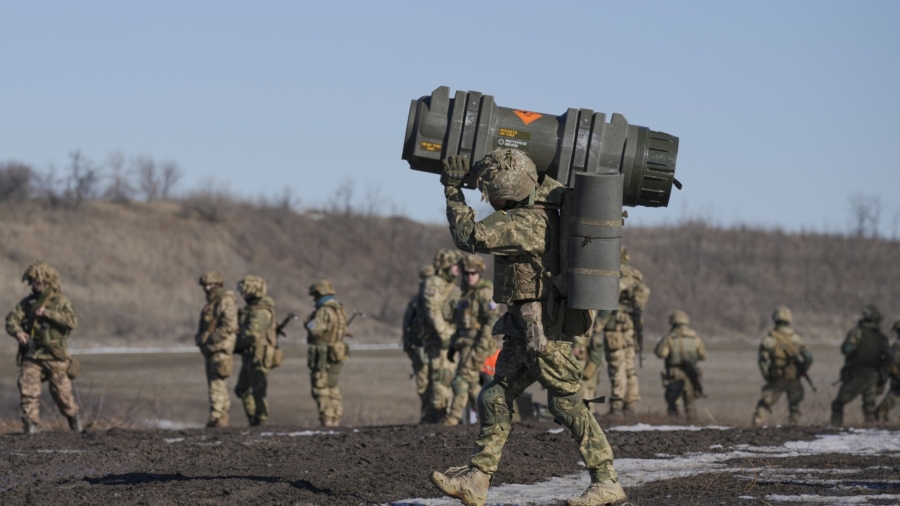As the situation in Ukraine continues to heat up, Moscow’s interaction with Beijing has drawn worldwide attention, amid the Chinese regime’s increasingly threatening actions toward Taiwan.
On Feb. 14, when being asked at a press conference whether China intends to take actions similar to the United States to evacuate all personnel from their embassy in Ukraine, Chinese Foreign Ministry spokesman Wang Wenbin said that China is closely following the development of the situation in Ukraine, and that the Chinese embassy and consulates are currently working as normal.
He also said that to solve the Ukrainian issue, everyone must return to the “New Minsk Agreement,” and called on all parties to remain rational and avoid actions that increase tensions and hype up the crisis.
Amid the opening of the Beijing Winter Olympics, Russian President Vladimir Putin and Chinese leader Xi Jinping took the chance to meet in person. When talking about Sino-Russian relations, Xi used “back-to-back” and “side-by-side” to describe the strategic relationship between the two countries, and published the “China-Russia relations Joint Statement.”
In response to the posturing by Russia and China, White House national security adviser Jake Sullivan said that if China decided to support any Russian invasion of Ukraine, then China “will end up owning some of the costs.”
On Feb. 13, Australian Prime Minister Scott Morrison criticized China for being “chillingly silent on Russian troops amassing on the Ukrainian border.” On Feb. 15, he urged China to denounce Russia. “I do note that the Chinese government, together with the Russian government, have been banding together on this issue and that the Chinese government has not denounced what is occurring in Ukraine,” he said.
But the situation is complicated. According to Su Tzu-Yun, Director of the Institute for National Defense and Security Research Military Strategy and Industry in Taiwan, “Moscow and Beijing are not real strategic partners,” he told the Chinese edition of The Epoch Times.
“They are just focusing on short-term diplomatic interests. From a long-term strategic view, it is impossible for China and Russia to have a real offensive and defensive alliance.”
In an exclusive interview with Indian media, Joseph Wu, Taiwan’s foreign minister, said that the rising tension between Russia and Ukraine may affect the competition between democracy and authoritarian power in the Indo-Pacific region. Taiwan is particularly focused on whether communist China will take the opportunity to invade Taiwan when the western allies are distracted by the Russian threat to Ukraine.
Li Zheng-xiu, an associate researcher at Taiwan’s National Policy Research Foundation, said that Beijing and the United States are actually observing each other.
“The Ukrainian crisis is now an indicator. China will observe the U.S. response as a basis for judging future engagements with the U.S. in all aspects; the U.S. is also watching to see if China will wait for an opportunity to escalate its military threat in the Indo-Pacific region.”
Li You-tan, a professor at Taiwan’s National Chengchi University, believes that both Russia and communist China know that invading Ukraine and Taiwan will lead to a world war, with very serious consequences. Instead, they use extreme pressure to show their expansion ambitions to the outside world in order to support their continued rule domestically.
Su believes that if China and Russia adopt strategic cooperation regarding the situation in Ukraine, it will only highlight their being an “authoritarian axis” and “warmongers,” and trigger countermeasures from Western countries, which may not be beneficial for them in the long run.
Lin Cenxin and Luo Ya contributed to the report.
From The Epoch Times


